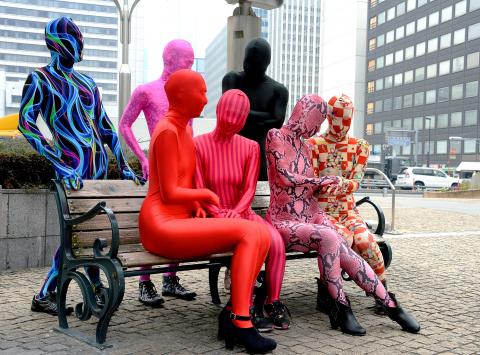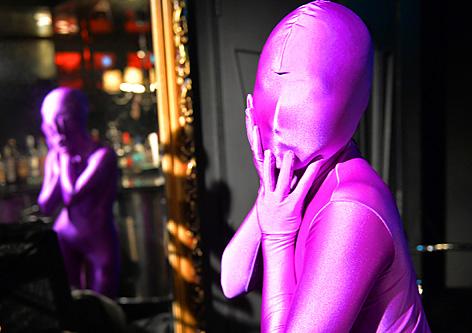By day, she is a mild-mannered office clerk, whose modest make-up and conservative hairstyle make her blend in to any crowd.
By night, she dresses in a skin-tight, all-in-one Spandex body suit that covers everything — including her eyes — and sits in bars, alone but liberated, she believes, from the judgment of others.
“With my face covered, I cannot eat or drink like other customers,” said the woman, who is in her 20s and says her name is Hokkyoku Nigo (North Pole No. 2).

Photo: AFP
“I have led my life always worrying about what other people think of me. They say I look cute, gentle, childish or naive,” she said, her lips ruffling the tight, red shiny material.
“I always felt suffocated by that. But wearing this, I am just a person in a full body suit.”
Hokkyoku Nigo is part of a small subset in Japan with a fetish for wearing outfits called zentai — an abbreviation of zenshintaitsu, which means “full body suit” — who say they are seeking liberation by effacing the physical self.

Photo: AFP
Some meet through Internet forums and through gatherings like the Tokyo Zentai Club, whose 10 members get together every other month, just like any other group, to hold barbecues or parties. Unlike any other group, they are covered head-to-toe in skintight Lycra.
“I was always fascinated by hero costumes as a child,” said member Hanaka, 22, who was introduced to the club by her 25-year-old boyfriend, Popo. “When I was 13 or 14, I even tried to make a full-body suit myself, sewing stockings together. But I stopped, thinking maybe I was doing something weird. I was really happy when I finally found out on the Internet that there were people like me out there,” said Hanaka, who always comes to Tokyo Zentai Club events with Popo.
INVISIBLE TOUCH
While the hobby is a long way from being mainstream in Japan, a country with an unsurpassed ability to dream up slightly off-the-wall pastimes, it makes occasional appearances in popular culture.
Among the most prominent was a movie of comedy vignettes that each focused on common but crushingly awkward social situations that were resolved through a conversion to zentai.
In one, a recipe-blogging housewife who is a victim of bullying by a group of homemakers gives up the fight against the over-bearing leader and finds liberation in a circle of zentai lovers.
And in seeming homage to the superheroes whose unspoken presence informs adherents’ costume choices, a young man dressed as a Power Ranger made headlines in Japan after it was revealed he hangs around at the entrance to a subway station to help young mothers carry their baby buggies down stairs.
While some might have good deeds on their minds as they slip inside their suits, others acknowledge there is something sexual about the practice.
“I like to touch and stroke others and to be touched and stroked like this,” said a 36-year-old teacher, Nezumiko.
“Once you are in one of these suits, you can feel the person, instead of looking at them. I am not a lesbian, but I wouldn’t mind being with a woman like this ... In zentai, it is a completely different kind of sensation from straight sex.”
“ERASING” APPEARANCE
Academic Ikuo Daibo of Tokyo Mirai University said zentai fans seems to be groping for a different way of expressing their own identity.
“In Japan, many people feel lost; they feel unable to find their role in society,” he said. “They have too many role models and cannot choose which one to follow.”
He said they take solace from the erasing of their outward appearances and say they believe it offers a way for people to get to know others as they are, rather than because of how they look.
“In a way, they are trying to expose their deeper self by hiding their own identity,” said Daibo. “I find it a very interesting way of communication.”
Alice Omori, 40, a practitioner for around 20 years who now runs an Internet-based tailoring service for fellow zentai fetishists, agreed.
“You can feel so good and happy just by wearing this,” he told AFP as he stood in his custom-made suit, cut to cleave tightly to the outline of his head, hands, penis and feet.
“You can savor more mentally-fulfilling communication with others,” he said. “It is such a wonderful thing.”

May 18 to May 24 Pastor Yang Hsu’s (楊煦) congregation was shocked upon seeing the land he chose to build his orphanage. It was surrounded by mountains on three sides, and the only way to access it was to cross a river by foot. The soil was poor due to runoff, and large rocks strewn across the plot prevented much from growing. In addition, there was no running water or electricity. But it was all Yang could afford. He and his Indigenous Atayal wife Lin Feng-ying (林鳳英) had already been caring for 24 orphans in their home, and they were in

On May 2, Chinese Nationalist Party (KMT) Chairman Eric Chu (朱立倫), at a meeting in support of Taipei city councilors at party headquarters, compared President William Lai (賴清德) to Hitler. Chu claimed that unlike any other democracy worldwide in history, no other leader was rooting out opposing parties like Lai and the Democratic Progressive Party (DPP). That his statements are wildly inaccurate was not the point. It was a rallying cry, not a history lesson. This was intentional to provoke the international diplomatic community into a response, which was promptly provided. Both the German and Israeli offices issued statements on Facebook

President William Lai (賴清德) yesterday delivered an address marking the first anniversary of his presidency. In the speech, Lai affirmed Taiwan’s global role in technology, trade and security. He announced economic and national security initiatives, and emphasized democratic values and cross-party cooperation. The following is the full text of his speech: Yesterday, outside of Beida Elementary School in New Taipei City’s Sanxia District (三峽), there was a major traffic accident that, sadly, claimed several lives and resulted in multiple injuries. The Executive Yuan immediately formed a task force, and last night I personally visited the victims in hospital. Central government agencies and the

Australia’s ABC last week published a piece on the recall campaign. The article emphasized the divisions in Taiwanese society and blamed the recall for worsening them. It quotes a supporter of the Taiwan People’s Party (TPP) as saying “I’m 43 years old, born and raised here, and I’ve never seen the country this divided in my entire life.” Apparently, as an adult, she slept through the post-election violence in 2000 and 2004 by the Chinese Nationalist Party (KMT), the veiled coup threats by the military when Chen Shui-bian (陳水扁) became president, the 2006 Red Shirt protests against him ginned up by